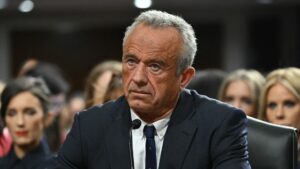RFK Jr. Faces Senate Grill in HHS Nomination: Key Insights from the Hearing
In a pivotal moment for public health in the United States, Robert F. Kennedy Jr. (RFK Jr.) appeared before the Senate Committee on Finance as part of his nomination process to become the next Secretary of Health and Human Services (HHS). As a nominee who stirs both support and skepticism, RFK Jr.’s testimony has sparked conversations transcending party lines about critical issues like vaccination, reproductive rights, and healthcare reform.
The Stakes of His Nomination
Kennedy, the controversial choice from President Donald Trump, was met with intense scrutiny from the senators. With a Republican majority in the Senate, he could only afford to lose three GOP votes if he hopes to advance his nomination despite unified Democratic opposition. Following this hearing, he is also scheduled to appear before the Senate Committee on Health, Education, Labor and Pensions, further emphasizing the gravity of his potential new role in a $1.7 trillion agency that oversees the health policies affecting millions of Americans.
Tackling Vaccine Skepticism Head-On
During his appearance, RFK Jr. addressed long-standing criticism regarding his vaccine skepticism—an issue that has drawn ire from both sides of the aisle. A noted vaccine advocate, he contended that he is “pro-safety,” advocating for vaccine safety rather than opposing vaccines themselves. He stated, "I support the measles vaccine, I support the polio vaccine," launching into an impassioned defense of his position.
However, senators challenged him by revisiting comments he made in the past, especially concerning the measles vaccine’s role in a severe outbreak in Samoa in 2019. Critics argue that his long-standing anti-vaccine rhetoric could dissuade the public from receiving vital vaccinations thus amplifying public health risks at a time when vaccination rates are already declining.
Navigating Abortion Policy
Kennedy also found himself in hot water when questioned about his stance on abortion—an issue he appeared to change in response to his nomination. He repetitively framed each abortion as a tragedy, leading Democratic senators to question whether he was shifting his views for political gain under the Trump administration. His comments about working with Trump on the regulation of the abortion pill mifepristone further muddled his position, leaving many unclear about where he truly stands on this polarizing social issue.
Challenges with Medicare and Medicaid
On matters of Medicaid and Medicare—two critical health programs covering millions of low-income, elderly, and disabled Americans—Kennedy struggled to present coherent responses. Missteps included conflating the two programs and inaccurate claims about Medicaid funding and enrollee frustrations. With approximately $600 billion in federal costs for Medicaid, understanding its intricacies is crucial for any HHS secretary.
Unique Insights: Understanding the Implications of Kennedy’s Potential Leadership
The implications of RFK Jr.’s confirmation as Secretary of HHS could be monumental. Not only would it elevate someone associated with significant controversy into a position overseeing public health policies, but it might also inspire large-scale reform discussions about the interactions between governmental agencies and pharmaceutical companies.
At Extreme Investor Network, we believe that this intersection of policy and public health also presents investors with an intriguing landscape. As the regulatory environment around health agencies and pharmaceutical companies could shift under Kennedy’s leadership, sectors like biotech and pharmaceuticals might experience volatility. Followers and stakeholders may want to keep a keen eye on how policy decisions evolve in this realm.
The situation is fluid, and potential confirmation will heavily depend on the support he garners from the Republican senators amidst growing concerns from across the political spectrum. As this story unfolds, Extreme Investor Network will continue to provide in-depth analysis and updates that focus not just on the political ramifications, but also on how these developments could shake up investment opportunities within the health sector.
Stay tuned for more updates from the Extreme Investor Network as we keep our finger on the pulse of changes that matter in the business and investment landscape.

